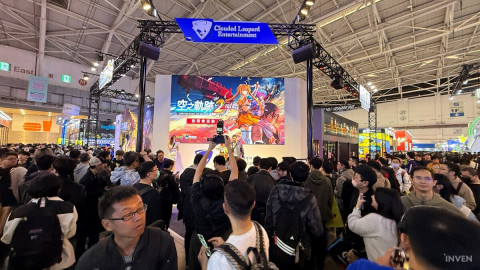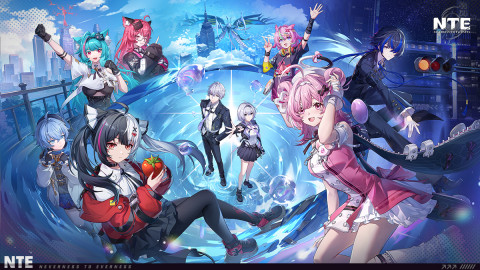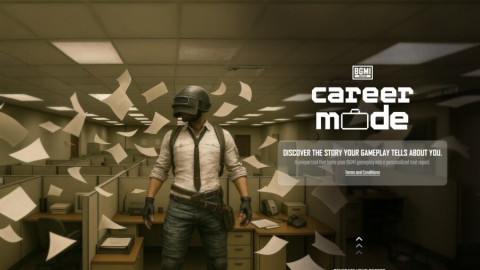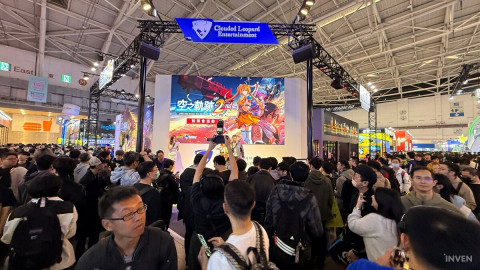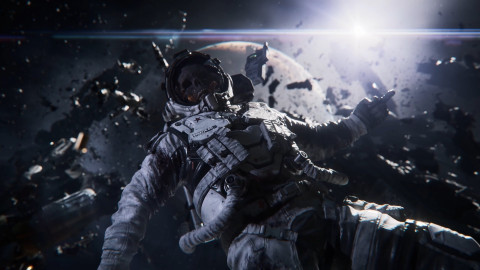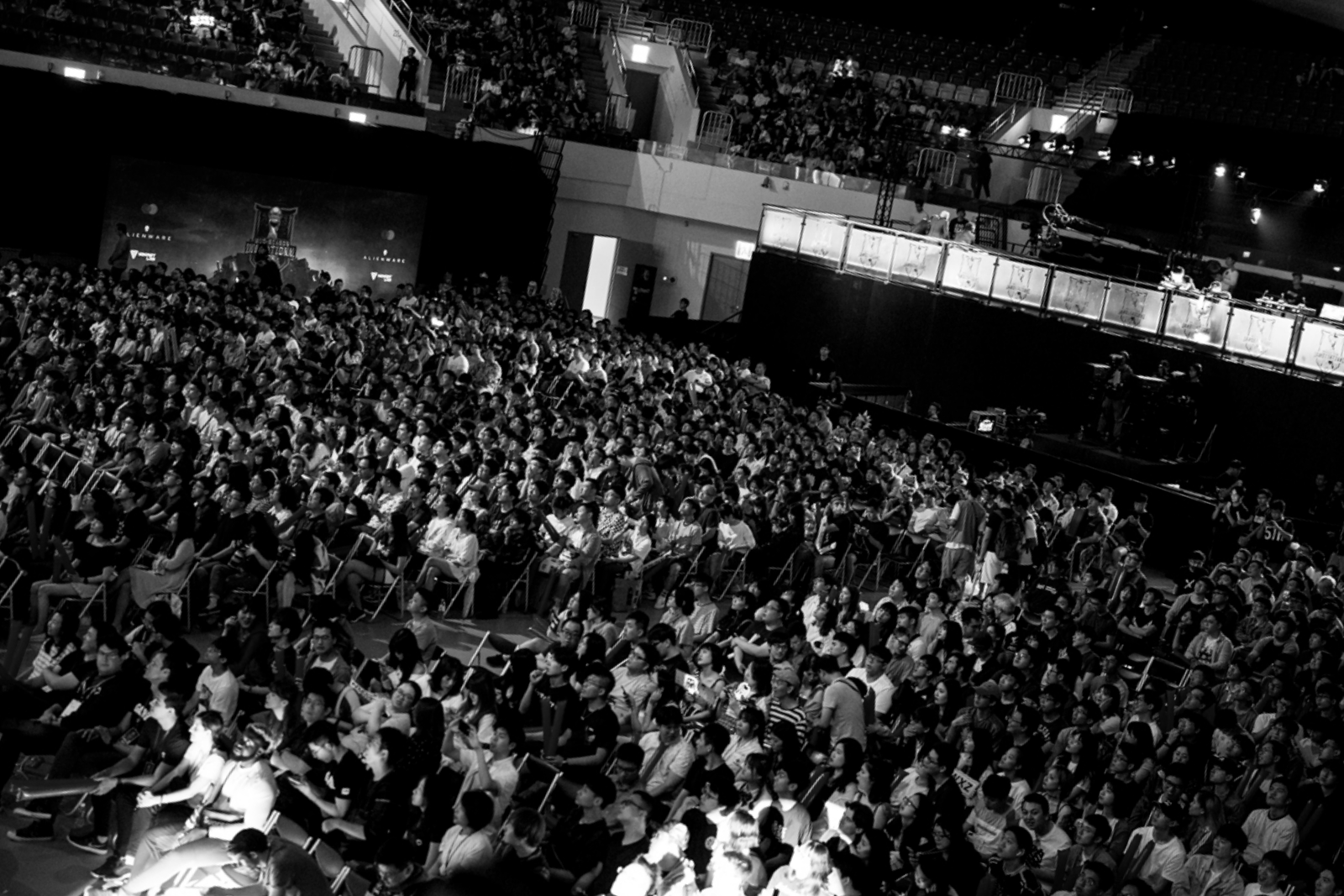
People outside of the esports industry (and those looking to join it ) often ask me how someone goes about becoming a professional gamer. When compared to the clearly defined path of traditional athletes, the methods of becoming a pro gamer can appear murky and unstable. Sometimes, a games competitive scene can be canceled overnight and, even if a pro player makes it to the top, their financial success is directly linked to the popularity of his or her esport.
In other words, becoming the best Battlerite player in the world is only as valuable as Battlerite is popular (and, as it turns out, the game never managed to take off). This wasn't a problem when competitive gaming was, to most, just an advanced hobby. However, as esports continues to be pushed as a viable career path, the nitty-gritty of what it actually takes to succeed is a topic that is seldom understood.
So, how does one become a professional player? The traditional process of "just-win-all-the-time" still exists in theory, but other paths have emerged in the past decade. For example, a successful streaming career can easily pave the way towards pro play, while other aspiring pros strategically jump from new game to new game, hedging their bets that an early adopter strategy pays off.
In some cases, securing alpha access to a game that has a strong chance of becoming a popular esport is the most important move an aspiring pro player can ever make.
However, despite all of the increasing complexities surrounding the pro player career (including what many would describe as failed attempts by certain triple-A game developers to create a clear path to professional play), my experience within esports leads me to believe that, for the majority of professional players, the arc to become a pro has remained the same.
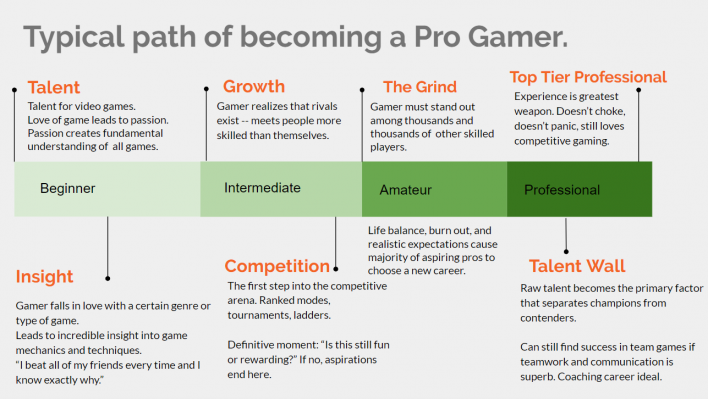
For brevity and practicality, I've attempted to outline the 6 major factors that I think help define a typical pro players relationship to video games:
Talent - "I've always been good at video games. Naturally, this makes me enjoy them more than most"
Insight - "I can tell you why I'm good at video games. Did you know you can X and Y to perform a Z?"
Growth - " I'm thrilled to find others like me. Let's play together constantly -- how about first to 50?
Competition - "I've practiced and practiced... and won! This feeling is incredible: time to chase it"
The Grind - "Every day I'm not practicing, my competition is. Is this stress really worth it?
Talent Wall - "I've climbed as high as I can possibly climb. How can I possibly improve any more?"
Top Tier Professional. "I know who I am and what I can do. This is what I was made for.
A lot of my friends and peers happily live in the "Growth" phase of competitive gaming. We love esports and taking a game seriously is how we most enjoy video games. For fun, we sometimes dabble in the "Competition" phase and enter a local tournament knowing full well our team will likely lose in pools. Ranked play, watching tournaments and casually obsessing over our ladder placement is our bread and butter.
But fans like us will never accept The Grind as something we can endure.
The Grind is something that nearly every pro player has either been through or continues to go through. Whether it is Bischu's incredible Overwatch League origin story or Score's tireless commitment to League of Legends, the overwhelming majority of pro players have ignored dozens of opportunities to quit. These opportunities aren't always visible to fans and outside spectators, but I assure you they exist and even the most amateur of professional player has to overcome them.
The Grind is what makes the honest answer of "how do I become pro?" so unsexy and so troubling to outsiders. To make a living competing, sacrifices have to be made. Long, long hours must be spent mastering mechanics and techniques that can disappear on a game developers whim. Players must spend significant time executing strategies and techniques that most won't find enjoyable or fun. At worst, all of this effort can go to waste if a players esport of choice fails to make a splash and doesn't attract the financial investment that makes a full-time pro career possible.
No one paid or pushed for this moment to resonate among gamers -- it just did.
And somehow, The Grind manages to become even less attractive thanks to the existence of the Talent Wall. Any pro player who has reached the Talent Wall should feel lucky and extremely proud. Few players reach the point of understanding their own personal skill limit and, those who do, often go on to make incredible coaches, commentators or esports org owners. Having talked to many players who, by their own admission, encountered this wall, I've learned that this realization almost always coincides with consistent exposure to world-class talent.
In other words, it is when the post-defeat conversation stops including 'I know I can beat them" statements. It is when a pro player no longer has the words to explain why they lost -- they just did and the reason why is duller than most would expect. Their opponent was faster, more precise, and more consistent in their execution. At the highest level, champions are very rarely distinguished by superior game knowledge and advanced strategy. It almost always comes down to pure mechanical prowess: which team or player has more disciplined horsepower behind their fingers.
What is even more incredible, is how the top tier professionals still manage to love the game they play. The joy of competing and training every day makes them more resistant to losses and player burnout. It also allows them to view the game they play as a blank canvass that allows them limitless opportunities to express themselves creatively and competitively.
When you speak to these top tier players, their love and reverence of the game they have mastered is obvious. I once had the opportunity to speak at length to Faker, the player who many agree to be greatest League of Legends player to ever exist and in no uncertain terms, he described his love of and passion for League of Legends.
He even joked about marrying the game if it were possible.


This is the same love and passion you can feel when Grubby talks about Warcraft 3 or when Mew2King talks about the Super Smash Bros. series. I'd argue that these players and many like them (GOATS of their respective esports) possess more than just talent that made their pro careers possible: they benefit from an unmistakable love of the game that is virtually impossible to fake or create artificially.
In other words, these players would have likely gravitated towards competitive gaming whether the rest of the world cared or not. Thankfully, it turned out that watching passionate players compete became one of most revolutionary forms of entertainment since reality television.
But, without this miraculous passion, is esports still revolutionary in 2019?
Modern esports thrives off the belief that this extremely improbable and passionate relationship with a video game can be obtained by anyone that tries hard enough to win at any game boasting a large enough prize pool. Large developers want to believe that their ranked systems and leagues can accurately and organically produce champions that the gaming world will revere and respect. In addition, esports audiences have come to believe that larger prize pools automatically mean more prestige, more competitive importance, and more entertainment.
"Unfortunately, the newfound plausibility of a professional gaming career means that many pro players won't always be playing the game they love -- they will be playing the game that makes them money."
Developers now chase an esports scene in an attempt to validate their product. All the while, the notion that esports careers are normal (or even natural) is rarely questioned -- instead it is propelled and celebrated. To question the concept risks an industry-wide collapse as the esports dream must be kept alive in order to draw in more players and sell more video games.
Can we blame multiplayer game developers for wanting an esport around their? The moment Blizzard announced the cancellation of Heroes of the Storm Global Championship, the community acted as if the game itself would no longer exist. The dreaded phrase "Dead Game" was being tossed around every community watering hole simply due to a lack of esports validity.
The logic is as follows: if a pro scene exists, it can be assumed that those competing are doing so for love of game, glory, and a fabulous lifestyle. If consumers notice a thriving esports scene, they should be more likely to assume the game in question has competitive depth and is deeply rewarding. They should feel safe investing their time in such a noble game because an esports scene means the game is popular and they are a part of something larger just by playing.
Maybe it sounds good on paper, but things can painfully transparent in reality. It becomes obvious that players are mainly concerned with securing a yearly salary, quickly become employees of the developers they are competing for. This means personalities are censored, everyone becomes clean cut, and the intensity of competitive gaming is lost.
It is happening slowly, but many esports fans can feel it anyway. A lack of authenticity, heart, and passion involving modern esports is, day by day, eroding away at the very appeal that enthralled audiences for years. It causes Overwatch League players to frequently retire due to burnout and pro players to practically resent Fortnite as an esport, despite actively competing over its massive prize pools.
Does the above clip make you think authentic esports? Is this the type of entertainment and broadcast that made esports appealing in the first place?
Do the majority of modern esports positioning themselves as the industries most valuable products actually inspire the passion and love of the game that has traditionally defined the esports industry? I have a sneaking suspicion that they aren't and I suspect audiences have already begun noticing.
In some competitive communities, the term esports has come to mean something decidedly negative. Esports can be synonymous with corporate take over, censorship, political correctness and the worst charge of all, a lack of authenticity.
No gaming community expresses this problem more often than the fighting game community. With a long history of grassroots organization and humble beginnings (including decades of rebellion against the very developers that create the games they compete in), many gamers feel that fighting games are the last place to find uncensored, raw competitive gaming entertainment.
Last year, two events stood out to perfectly encapsulate this. There was Battle of the Strongest 2: NYC Battle Royale, a Marvel vs. Capcom 2 community event that enjoyed an $8,000 prize pool donated by fans and Cooperation Cup: 18, the largest most prestigious Street Fighter: 3rd Strike tournament held annually in Tokyo, Japan.
Both of these events were defined by their uncensored streams, their brutally skilled gameplay, and an undeniable feeling of hype that permeated both events. Whether you follow the games or not, tuning into either stream would bring you an entirely different esports experience than what is currently being offered to mainstream consumers.
The passion on display was apparent and a worrisome phrase was uttered during both broadcasts more than once: "F*** esports!". The phrase usually came after playful jeers about Fortnite or in response to the streams lack of professional assets like online brackets or sponsored advertisements.
And yet, every time it was mentioned, Twitch chat rallied in support, echoing the statement in the rebellion of the very thing they were watching. It would seem that the hype and unfiltered appeal of these events were being presented as the natural foil to the corporate, safe nature of ad-friendly esports.
Just listen to this emotional moment from IFC Yipes, a beloved veteran and commentator of the fighting game community:
You can tell that, at this moment, IFC Yipes fell in love with competitive gaming all over again. He had just recently finished an exhaustive tour commentating the 2018 Capcom Cup (an environment decidedly more corporate than Battle of the Strongest 2) and this genuine moment in an apartment room was a significant one that reminded everyone watching how and why esports came to exist in the first place.
A lot of people took notice online. Despite peaking at a little less than 5,000 viewers, Battle of the Strongest 2 captured something special.
Modern esports knows how to put on an incredible spectacle, but they rarely come close to capturing the buzz and emotional intensity competitive gaming is capable of creating.
Perhaps the reason it is so difficult to answer "how do I become a pro gamer?" is because the question doesn't have a long history of being asked. Any rational attempt to outline the steps starts to resemble horribly bad advice when telling it to someone who thinks "esports professional" is a legitimate career they can simply choose.
How do you become an esports pro? You don't -- it just happens. You just spend your entire life gaming, fall in love with video games, and the very act of obsessing over them constantly will create the path before you. It requires a ton of natural talent, tons of luck, and the ability to ignore most other aspects of your life in favor of gaming competitively.
The only reason any of this makes any sense is if you have fallen in love with the game you are competing in. If you would still compete with no money, no sponsorship, or no lucrative streaming deal at stake, then you maybe have a shot at becoming a pro gamer. All of the sacrifices are supposed to be worth it because you are doing what you love in a competitive community you enjoy being in.
This is the core factor of resilient and thriving esports communities. Even when the sponsors leave and the venues become smaller, the players still compete and the community still watches. The competitions still happen because it has only ever been about the competition -- for fans and pro players alike.
Unfortunately, the newfound plausibility of a professional gaming career means that many pro players won't always be playing the games they love -- they will be playing the game that makes them money. This relationship is mirrored in all manner of esports careers; commentators, content creators and tournament organizers don't have the luxury of working in the game they are truly passionate about: everyone follows the money and rightfully so.
Can the esports industry afford to pretend this decision comes at no cost? Can the passion that built esports survive when the games we compete in are dictated by whichever developer invests in the largest prize pool?
How many pro gamers can still joke about marrying the game they compete in?
Maybe the birth of a successful esports is a lot like the big bang theory that attempts to explain the creation of the observable universe. Maybe it takes a very particular type of game, a very particular group of players, and a very particular type of audience to all exist in the same moment and BANG: an authentic esport appears that hundreds and thousands of fans will flock to.
On the other hand, maybe it isn't like this. Maybe with enough money and advertising any game can be turned into an esport with passionate fans and legendary players. Maybe regional teams, celebrity streamers and DJ's will propel esports to a new stratosphere of success that makes a dinky apartment in New York feel like something small and insignificant.
Maybe that's the future, but I don't think we are there yet. A lot of esports today have a lot of money flowing through them but, what happens when that money stops? Will their communities rally together in convention centers and basements, still competing for the glory and the thrill of it all?
Or will the competitive elite look towards whatever new game arrives with the largest prize pool and compete in that? After all, they have chosen the career of a professional gamer and professionals need to get paid -- when esport is your job there really is no other choice.
Perhaps the more accurate question is, will consumers flock to watch someone just do their job?
-

Warcraft 3 is my one true love and I will challenge anyone to a game of Super Smash Brothers Melee.
Sort by:
Comments :0

